Click here for Exit the Cuckoo's Nest's posting standards and aims.
The appreciation of beauty is the beginning of wisdom
An interview with Paul Cudenec about the importance of Beauty in anarchist philosophy
(What you are about to read is the second of a series of interviews in which Paul Cudenec and I will discuss the philosophy which he lays out in The Withway, his seminal new work. I invite the reader to check out the first interview here, as well as this article in which I write about the importance of The Withway in the context of the process of political reorientation now taking place amongst the survivors of the ideological collapse of the Left. Enjoy!)
We can assert with some confidence that our own period is one of decline; that the standards of culture are lower than they were fifty years ago; and that the evidences of this decline are visible in every department of human activity. I see no reason why the decay of culture should not proceed much further, and why we may not even anticipate a period, of some duration, of which it is possible to say that it will have no culture”.
-T.S. Eliot, writing in 1948
Anything based on the toxic anti-values of separation, self-interest, exploitation, slavery, domination and greed, anything and anyone fundamentally bad, can never transmit beauty. As Ellul insists: “Everywhere, Technik creates ugliness”
In beginning to speak of Beauty, the knowledge of which is indisputably subjective, it feels appropriate to speak in the first person, to speak of the importance of Beauty in my own cosmovision.
Truthfully, to my mind, nothing but Beauty is truly important. To me, that which is beautiful is good, that which is good is beautiful. Therefore, in forming my political consciousness, I refer not to any objective set of logical principles, existing on some vaunted plane, but to my own capacity, born of some sense of reverent awe for That Which is Beautiful, to appreciate that which is good, and to know it by the feeling of ecstasy that it produces within me.
In other words, I am a Romantic. I am not a rationalist or an objectivist or anything else. I will argue in rational or logical terms if it seems to me worth the trouble of doing so, but make no mistake - I am a Romantic, and I make no appeal to any authority higher than that of my own sense of Beauty.
At the end of the day, I am an activist not because I am a Boddhisattva animated by boundless compassion for the suffering of Mankind. I am a revolutionary because my spirit is offended by the ugliness of the modern world. I am a revolutionary because I believe that humanity is capable of so much more than the vulgar endeavour of profiteering and domination with which it has been obsessed for centuries.
Truthfully, I hate politics. It is the domain ruled by those who think themselves clever, but do not love wisdom. By the time that I die, I hope that I am regarded not as political thinker, nor as an activist, nor even as a mystic, but as an artist.
But I digress. Let us approach the subject at hand.
Perhaps it is because I am essentially guided by a sense of a sense of aesthetics that I am so drawn to the work of Paul Cudenec, for he is one of the few contemporary anarchist philosophers who seems to me guided by the desperate longing for Truth which has inspired mystics since the beginning of time. In the Withway, he writes:
When nature is able to express itself fully and clearly through the human mind and hand, its original beauty shines through.
For 19th century art critic John Ruskin and the Pre-Raphaelite movement he inspired, there was a withness in medieval society which remained visible in its artistic achievements, such as the great Gothic cathedrals of Europe.
Gothic, in Ruskin’s eyes, was a form of art that was natural, human and beautiful, an art which expressed a social world of “tranquil and gentle existence, sustained by the gifts, and gladdened by the splendour, of the earth”.
These three qualities – natural, human and beautiful – always go together in Ruskin and the Pre-Raphaelites’ shared vision and are contrasted with a modern industrial world which is artificial, inhuman and ugly.
Elsewhere, he quotes William Morris, who wrote:
“Everything made by man’s hands has a form, which either must be beautiful or ugly; beautiful if it is in accord with Nature, and helps her; ugly if it is discordant with Nature, and thwarts her; it cannot be indifferent”.
In The Withway, Paul Cudenec refers more to poets and artists such as William Blake and T.S. Eliot than to classical anarchists such as Pyotr Kropotkin and Nestor Makhno. Indeed, quotes from classical anarchists such as Emma Goldman, Errico Malatesta, and Mikael Bakunin are notably absent.
Alfred Noyes depicts Ruskin as the prophet of the new religion, “the religion of beauty”. He taught the young artists that it was in nature that they would find the aesthetic inspiration that had infused the Gothic cathedrals with their forest-like interiors, urging them to “go to Nature... rejecting nothing, selecting nothing and scorning nothing”.
“It is simply fuller Nature we want”, declared William Holman Hunt and the Pre-Raphaelites honoured not only the artistic tradition of the Middle Ages but also its way of thinking.
Ananda Coomaraswamy explains that from the medieval perspective, the form, beauty, goodness and truth of a thing are seen as deeply connected, almost synonymous.
Art, like nature, is the outpouring of universal light. The individual artist is just one natural channel through which this light passes and makes its beauty visible, on a canvas or in a sculpture as in a mountain or a forest.
CROW - Okay, let´s talk about art! In the Withway, you present Beauty as a value in-and-of-itself, intimately connected to the ideas of Truth,Nature, Withness, and Anarchy. Personally, I agree wholeheartedly with this. I have long believed that Truth is Beauty and Beauty is Truth, and much of my political activism is inspired by a feeling of Disgust at the Falsity, Artificiality, and Ugliness of the modern world, which values neither Truth nor Beauty.
To me, my morality is very much informed by my sense of aesthetics. So far as I am concerned, that which is Beautiful is Good, and that which offends my sense of Beauty is Bad. (I should clarify here that I am not referring here to some which is more conceptual than visual). Is this how your mind works also?
PAUL - Yes - in the same way that we can use our sense of smell to tell if food has gone off or is still good to eat, our innate sense of visual aesthetics alerts us to something about the inner quality of what we are observing. However, we also need to be aware that aesthetics can sometimes be used to deceive us into seeing value in something which is only superficially beautiful. I wrote a bit about this in my novel The Fakir of Florence, which as well as being a work of fiction is also, in fact, an account of my real-life thoughts about the art I discovered in that astonishing city in the course of a month I spent there in 2015.
While deeply moved by the light of purity, the sacred simplicity, of earlier works of the Quattrocento (15th century) in Italy, I ended up questioning whether the Renaissance was not already the stage at which the cultural rot was already beginning to set in.
I wrote: "The authentic and powerful purity that motivated the art has been hijacked, stolen, and its magical force is now harnessed for the impure ends of those who own the object, the gallery, the civilization that can claim the art as its heritage. That is what has been making me so uneasy here. I have been dragged into a world which proclaims that money is not, after all, incompatible with inner beauty. I have been fooled by the cultural recuperation of the Florentine past into half-accepting the enormous lie it dreamt up – that there was nothing unholy, ugly or fundamentally wrong about living for financial profit".
And a bit later I added: "By the time we reach the 16th century the gold has disappeared from the works of art themselves and fled out to the frames in great heavy, ugly, twists of ostentation. The heavenly light, too, has fled from the paintings".
CROW - I remember reading one of the Situationists saying that the problem with modernity was not greed, but bad taste. His argument was that if people had a taste for that which was truly good, they would not waste their lives working to accumulate wealth to buy consumer goods to impress their neighbours, but live their lives ecstatically ¨following their bliss¨ (to borrow to term from Joseph Campbell). On an individual level, does following the Withway mean following one´s bliss?
PAUL - I agree with that Situationist comment. I have always felt anaesthetic aversion, which cannot be separated from an ethical aversion,to all that is commercial, that is to say built on a desire for profitand the search for status and thus domination over others. The world of"business" and advertising and marketing is ugly on the inside and theoutside. I would say that accepting this feeling within me, and lettingit become one of the foundations of my own worldview, was part of myorientation towards the Withway. But what about people who don't findthat world repulsive, who are attracted to its deceptive surface glitter?
I would say they that they have some work to do in breakingthrough all the layers of cultural assumptions that have led them astray. The deepest place we can go within ourselves is the collective place, that of humankind, nature and indeed the underlying patterns of the whole living cosmos.
So ultimately good taste, a taste which corresponds to beauty and truth, is not about a personal outlook. It is rather about the extent to which we have managed to allow greater truths, shared truths, to shine through the dirt and distraction of a narrow and self-centred existence. Real individual strength means breaking out of the individual level to know the greater reality which gives meaning to our temporary existences.
CROW - Now, I have basically made it my life mission to drink deeply from the well of life, although in practice this produces despondency as well as bliss, for I often despair at the ugliness of the modern world.
This has involved prioritizing my own desires and creative vision above all else, which could easily be construed as selfishness.
PAUL - This is the thing - it is only by embracing our own inner creative desires that we can access greater truth. Otherwise, we are merely looking at second-hand photocopied versions from other people's experiences and visions. They may tell the truth, and guide us in our search for the truth, but they are not the truth itself. That truth, which is also light and beauty, is primal and has to be experienced directly if it is to be experienced fully. If you pursue your own path with absolute authenticity and courage, you will find that you are walking the Withway.
CROW - One of the things that I like about your focus on Beauty as a universal value which should guide revolutionary politics. I personally reject the lionization of the Worker as the revolutionary subject that was so prevalent throughout the 20th century.
To me, it seems disingenuous to identify the revolutionary subject in economic terms. Rather, I prefer to cast the Artist as the revolutionary subject, as the Hero and protagonist of political struggle. What do you think of the idea of placing the Artist as the model for revolutionaries to aspire to emulate?
PAUL - It is certainly odd to lionize "the Worker" - given that freeing human beings from their debased status of being merely "workers" should be at the heart of our revolt. And yes, we need to cast off the blinkers of "economic" utility in order to catch sight of the other world of which we dream.
The Artist in the broad sense, certainly - Colin Wilson used the term The Outsider to mean this and we might also talk about TheRebel. The essential element is that this is a man or woman who has risen above the level to which this system works so hard to reduce us, who even regards their own life and security as of lesser importance than the Cause to which they are committed. This, to me, is what is inspiring about the idea of a revolutionary. This is not even about an individual reaching some kind of heroic status - the pure ideal would maybe be someone who is so selfless that they remain entirely anonymous in the struggle.
CROW - You are clearly inspired by English, French, and German Romanticism. Could you please share your thoughts on the connections between anarchism and Romanticism?
PAUL - I am not sure if I have been influenced by Romanticism or it is just that I have found in Romanticism a spirit that I recognise as my own. It is about a type of person perhaps, a particular way of seeing and living life. It is about being animated by the vital spirit within, rather than calculating the best means of achieving personal material advantage or security. It's about being in touch with greater forces than your individual life and yet insisting that you as an individual will not be crushed and subdued by the society around you. It is, you could say, the half of anarchism that has been lost by the contemporary conformist clones who have stolen its name. It is the recognition of what we were discussing earlier - that it is through the expression of innermost individuality that we can play the role we were born to play in the collective self-realisation of our communities and our species.
It is a question of being fully alive rather than half-dead like so many people seem to be today. A society made up of half-dead individuals can only ever be half-dead itself.
CROW - It seems to me that a critique of Technik goes back to the very beginning of both anarchism and feminism. Mary Shelley, author of Frankenstein, uses the metaphor of an early human victim of a twisted science experiment to throw shade on modernism.
Now, it bears mentioning that Mary Shelley was the lover of the anarchist Romantic poet Percy Shelley and the daughter of William Godwin, who is sometimes cited as the first anarchist.
PAUL - Well, yes. William Blake had the same critique. It seems obvious to me that a movement which aims for the liberation of humanity from slavery would be hostile to the tools with which that slavery is imposed!
That initial, intuitive, response has since been hammered out of would-be rebels by the relentless propaganda of the industrial system, which ridicules and shames those who oppose its machineries and lies. We are described as being stupid, naive or uncaring about the well-being of those whose lives it supposedly improves. The word "reactionary" is often deployed in contrast to the "progressive" support for Technik and its world, in a bid to render an anti-industrial position impossible for anyone who want to belong to officially-authorised anarchist or "left-wing" circles.
This smearing strategy is of course today very apparent in the attacks on"anti-vaxxers" who refused to bow to "The Science". But this is just the latest manifestation of a manipulation that has been going on since Shelley's days.
CROW - You are clearly a huge fan of Richard Jeffries. Winter Oak Press has published two books about him, and you cite him as a major influence in various places throughout your body of work. I'll confess that I know nothing at all about Richard Jeffries. Could you please explain the influence that he has had on your life, and why he is an important thinker?
PAUL - We republished one book about him (by Henry Salt) and one by him, The Story of My Heart. The personal importance of Jefferies for me lies in his descriptions of his walks in nature, in which he connects spiritually not just with that particular place but with the living world in general, across the millennia. He rises out of his body and his time to speak of that of which I have always yearned to know.
When I first read Jefferies, he provoked a deep spiritual pain within me, born of the fact that because of my circumstances I was rarely able to immerse myself in a presence with nature such as he described. I remember putting one of his books aside, at one stage, because it made me miserable to realise what I was missing out on! This feeling was probably increased by the fact that Jefferies died young after years of declining health (TB) and expressed until the very end his frustrated desire to live and to live fully. When I read him, I felt my own life slipping away too fast, as well. But ultimately he pushed me into spending more and more time in the countryside, particularly on the chalk Downlands of which he often wrote, and I found that I too was able to experience what he had experienced. I had a spiritual awakening which changed the whole course of my life. What a debt I owe that man!
This probably answers your question as to why I think he is an important thinker, but I could add that his 19th century novel After London (a sort of early science-fiction work about a post-industrial England) was an influence on William Morris and thus on the whole "utopian"socialist/anarchist tradition consigned to the dungeons of wrongthink by industrialist Marxism.
CROW - One of the things that I liked about Deep Green Resistance, the influential book co-written by Derrick Jensen, Lierre Keith, and AricMcBay, was its focus on the Wandervogel, who might be thought of as the first anti-industrial counterculture.
PAUL - Yes, I wrote a little piece about the Wandervogel recently, in fact. That whole early 20th century scene, particularly around Ascona, in Switzerland, was remarkably similar to the 1960s counterculture that gave so much hope to the likes of Theodore Roszak. The revolt was ended by the Great War then Adolf Hitler. Progress marches on!
CROW - One thing that I admire about you is that you have exhibited the moral courage to have unfashionable opinions over the course of your career. One example of this is to be found in your defence of German Romanticism, also known as the Volkisch movement, during the Anarchist Inquistion, a period of time when Alexander Reid Ross (who has since been exposed as an intelligent agent) and others sought to associate Volkisch ideology with nazism. You do an exquisitely thorough job of debunking this misconception in Organic Radicalism: Breaking Down the Fascist Machine, which has been published as a zine by Nevermore Media. For those readers unfamiliar with ARR and the Anarchist Inquisition, could you please tell us why it was necessary to write a defence of German Romanticism?
PAUL - I am not sure there would be any point in expressing my opinions if they were already fashionable! The question of the Volkisch movement is tied in with the story of the Wandervogel. The terrible thing is that because part of the movement was co-opted by the Nazi regime, it is now often used by defenders of the system, like Ross, to argue that the whole back-to-nature ethic risks leading to Nazism. This is total rubbish, of course. Nazism, like Fascism and indeed Soviet Communism, was a hyper-industrialist phenomenon which cynically hijacked anti-industrialist feeling in Germany to garner support. The system always does this. At the same time as it crushes opposition it sucks it up, contaminates it with its own toxicity and then spits it back in our faces!
The point I make in the article in question is that we now have to not only take on board the truth that the Volkisch movement was not actually compatible with Nazism, but also that this truth has been deliberately and cynically distorted in order to prevent the emergence of similiar anti-industrial movements in the future.
This additional layer of understanding has to become part of the core philosophy of our 21st century anti-industrialism - we need a incredibly wised-up movement, aware not only of industrialism itself but also of the system behind industrialism and the insidious ways in which this system operates.
CROW - Amen to that. And with that, we conclude this instalment of this series of interviews. Thank you for taking the time to answer my questions, Paul, and I hope that I have inspired at least a few people out to read The Withway.
It feels appropriate here to quote the closing passage from The Withway, for I believe that here Paul returns to an idea which is the alpha and omega of not all anarchist philosophy, but all philosophy.
Philosophy is nothing other than the love of wisdom. And if I am sure of anything in this life, it is this - The appreciation of beauty is the beginning of wisdom.
The Withway is an old way asking to become the new way.
It is the eternal way, the human way within the natural and universal way.
“What intense joy we can gain in sensing the wondrous phenomenon of Heaven and Earth – the light of the sun and the moon; the passing and re-passing of the four seasons; the changing shapes in cloud and mist; the mountain’s profile; the dancing stream; the soft breeze; moisture of rain and dew; purity of snow; smile of flowers; growth of fragrant herbs; infinite life of birds, beasts, fishes and insects,” writes Ekken.
“To make ourselves conversant with this wonderful nature is to expand our hearts, purify our feelings, arouse holy thoughts, and wash away all low and unclean desires. This is called inspiration, for the goodness which is within is aroused, and flows out at the touch of the outer world”.
When you have finished reading this, why not go outside and look up at the blue sky, the clouds or the stars?
Listen carefully. Even in the densest city, you will hear it. The call of an unseen bird. The giggle of an invisible child. Leaves set a-rustling by a breeze from beyond. Phantom faery voices singing of time long gone, of time yet to come.
Listen carefully. The Withway is calling us home.
Source: NEVERMORE MEDIA

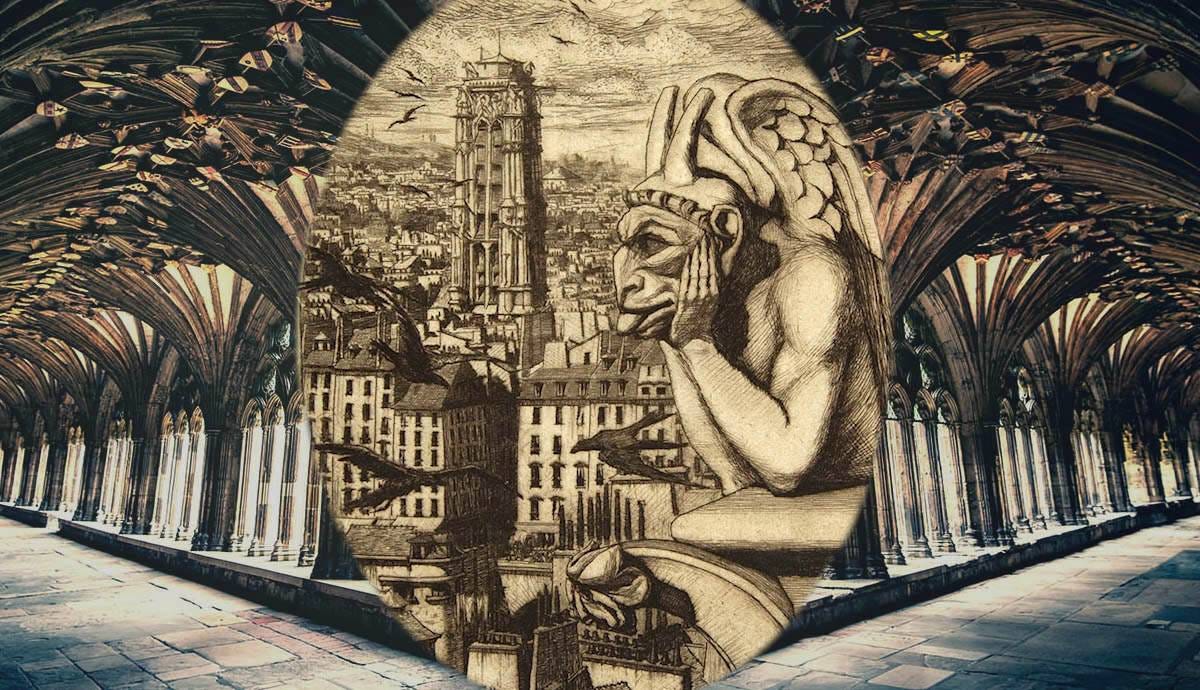
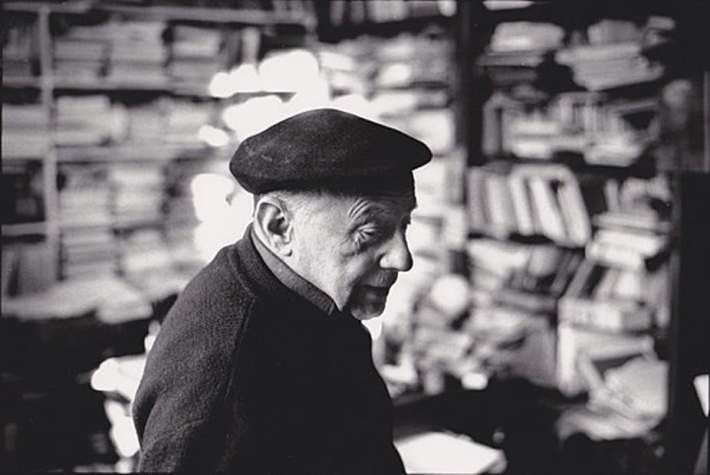
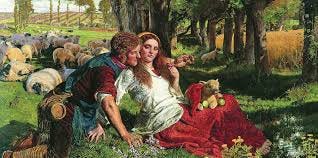
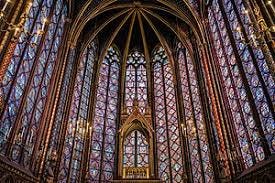
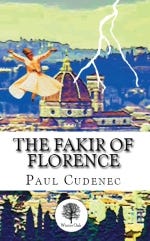
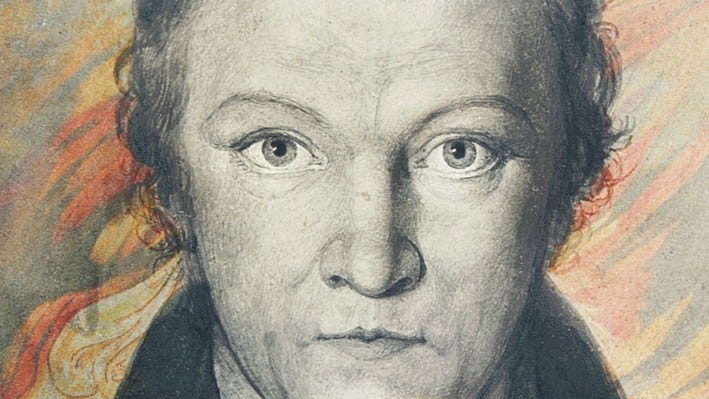
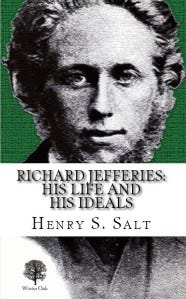
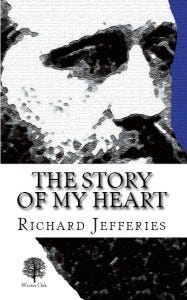
No comments:
Post a Comment